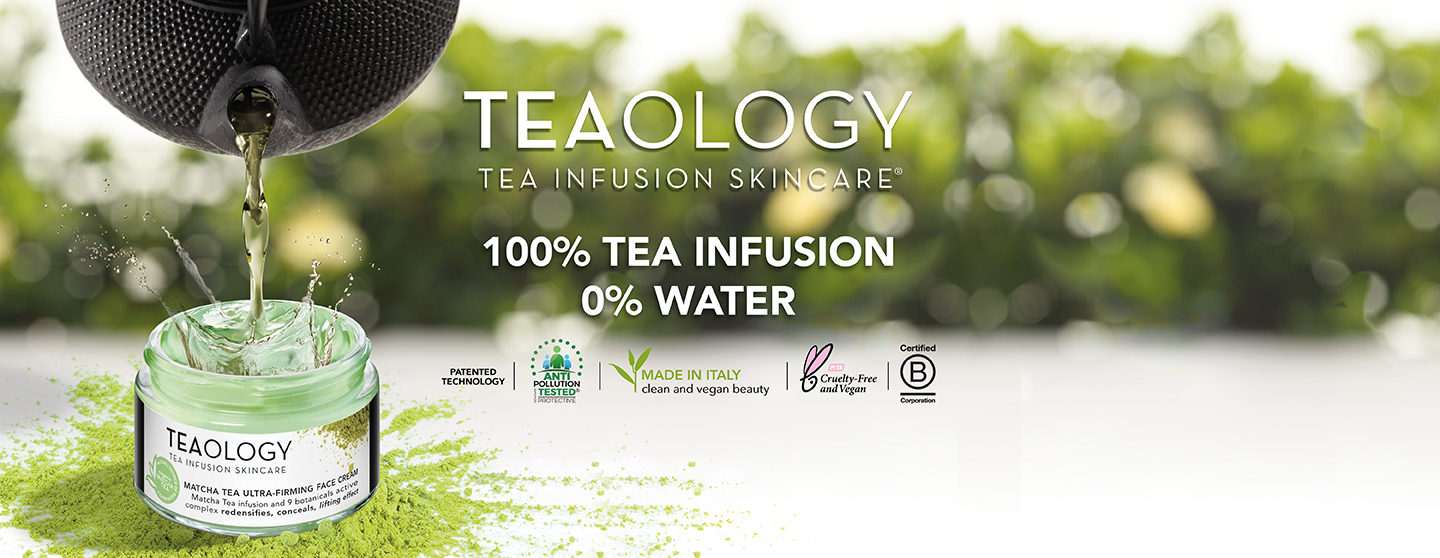

Teaology Skincare Italy

Lombardy, Italy
July 2022
Personal care products
Wholesale/Retail
Austria,
Canada,
China,
Croatia (Hrvatska),
Cyprus,
Czech Republic,
Estonia,
France,
Germany,
Hong Kong S.A.R.,
Hungary,
India,
Italy,
Latvia,
Lithuania,
Malaysia,
Netherlands The,
Portugal,
Romania,
Singapore,
Slovakia,
Slovenia,
South Africa,
Spain,
Switzerland,
Ukraine
Teaology is an independent Italian beauty brand of clean, vegan, effective, sustainable cosmetics. We believe that what is good for us is good for our skin, for this reason we have packed in each product the antioxidant benefits of tea, a millennial medicinal plant, using a patented technology “Tea Infusion Skincare”. All our products are 100% made in Italy, formulated with raw materials from renewable sources and clean, clinically tested ingredients. Production is outsourced to manufacturers in certified low environmental impact facilities. Our packaging is at 99% recyclable and, when possible, recycled: every day our team work passionately to find more sustainable solutions knowing that every little improvement can make a difference. We are proud to be part of B Corp community, this certification is one of our external commitments in order to make us more and more sustainable because this is the only way to save the planet and ourselves. B for Beauty.
Overall B Impact Score
Governance 16.3
Governance evaluates a company's overall mission, engagement around its social/environmental impact, ethics, and transparency. This section also evaluates the ability of a company to protect their mission and formally consider stakeholders in decision making through their corporate structure (e.g. benefit corporation) or corporate governing documents.
What is this? A company with an Impact Business Model is intentionally designed to create a specific positive outcome for one of its stakeholders - such as workers, community, environment, or customers.
Workers 25.0
Workers evaluates a company’s contributions to its employees’ financial security, health & safety, wellness, career development, and engagement & satisfaction. In addition, this section recognizes business models designed to benefit workers, such as companies that are at least 40% owned by non-executive employees and those that have workforce development programs to support individuals with barriers to employment.
Community 13.8
Community evaluates a company’s engagement with and impact on the communities in which it operates, hires from, and sources from. Topics include diversity, equity & inclusion, economic impact, civic engagement, charitable giving, and supply chain management. In addition, this section recognizes business models that are designed to address specific community-oriented problems, such as poverty alleviation through fair trade sourcing or distribution via microenterprises, producer cooperative models, locally focused economic development, and formal charitable giving commitments.
Environment 25.2
Environment evaluates a company’s overall environmental management practices as well as its impact on the air, climate, water, land, and biodiversity. This includes the direct impact of a company’s operations and, when applicable its supply chain and distribution channels. This section also recognizes companies with environmentally innovative production processes and those that sell products or services that have a positive environmental impact. Some examples might include products and services that create renewable energy, reduce consumption or waste, conserve land or wildlife, provide less toxic alternatives to the market, or educate people about environmental problems.
Customers 4.2
Customers evaluates a company’s stewardship of its customers through the quality of its products and services, ethical marketing, data privacy and security, and feedback channels. In addition, this section recognizes products or services that are designed to address a particular social problem for or through its customers, such as health or educational products, arts & media products, serving underserved customers/clients, and services that improve the social impact of other businesses or organizations.